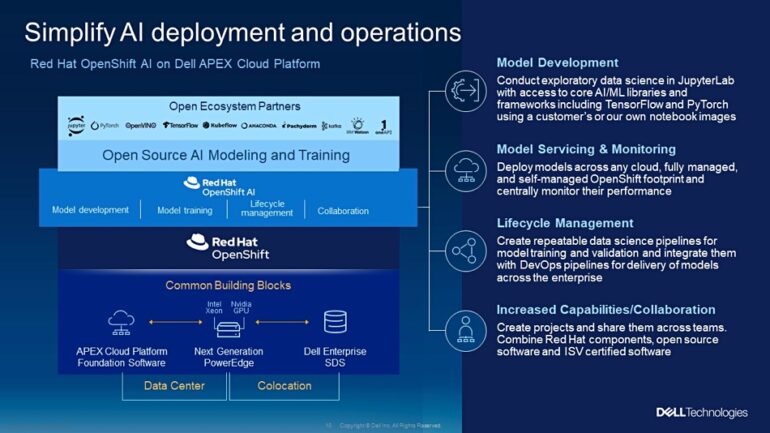TL;DR:
- Dell introduces APEX Red Hat OpenShift service for enterprise-style container management.
- Red Hat OpenShift, based on Kubernetes and Ceph, is at the core of this offering.
- APEX Cloud Platform enables easy container deployment alongside virtual machines.
- Jointly developed with Red Hat, it boasts gen 4 Xeon processors and PowerFlex storage.
- Integration with Red Hat OpenShift streamlines updates and provides fast access to patched code.
- Dell offers support services to help customers adopt and master this solution.
- Additionally, Dell presents a guide for deploying AI using Large Language Models (LLM) and Retrieval Augmented Generation (RAG).
Main AI News:
Dell has unveiled a groundbreaking APEX Red Hat OpenShift service, revolutionizing the experience for OpenShift users. This innovative offering allows users to seamlessly subscribe to open source container management software within an enterprise-style framework. Red Hat OpenShift, owned by IBM, is a prominent container orchestration service based on Kubernetes, complemented by Ceph open-source storage. Dell’s APEX service delivers computing, storage, and networking solutions through a cloud-like subscription model, empowering businesses to harness the full potential of containerization.
In a pre-publication blog post, Dell described the APEX Cloud Platform as the “first fully integrated application delivery platform purpose-built for Red Hat OpenShift.” With Gartner predicting that over 95 percent of global organizations will embrace containerized applications in production by 2028, the demand for a robust container app infrastructure platform is more significant than ever. Dell firmly positions OpenShift as the solution of choice for this critical need.
The APEX Cloud Platform enables customers to effortlessly deploy, manage, and operate containers alongside virtual machines on their premises. This platform, developed collaboratively with Red Hat, is powered by the latest-generation PowerEdge MC-760/MC-660 servers featuring gen 4 Xeon processors and PowerFlex software-defined block storage employing SAS or NVMe SSDs. PowerFlex, a Ceph storage replacement, seamlessly integrates with Dell APEX Navigator to facilitate data replication between on-premises and APEX Block Storage for Public Cloud.
Notably, the APEX Cloud Foundation software is seamlessly integrated into the Red Hat OpenShift web console, marking a significant milestone as the first integrated application delivery platform for Red Hat OpenShift in the market. This integration streamlines component updates, potentially reducing update times by up to 90 percent compared to manual processes. Moreover, it offers customers swift access to patched code, all while presenting open source software in an enterprise software fashion, sparing users from the complexities of open-source maintenance.
Dell complements its APEX Cloud Platform with a range of services designed to assist customers in quickly mastering this powerful software suite, ensuring a seamless transition to a containerized application environment.
Unlocking AI Potential: Dell’s Vision for Red Hat OpenShift AI on APEX Cloud Platform
In a forward-looking move, Dell introduces a validated design for Red Hat OpenShift AI on the APEX Cloud Platform. This groundbreaking initiative provides customers with a comprehensive guide on deploying a digital assistant leveraging a Large Language Model (LLM) and the Retrieval Augmented Generation (RAG) framework. Designed for multi-cloud environments, it demonstrates how customers can securely employ RAG with their proprietary data, even on-premises.
IBM heralds the Retrieval Augmented Generation (RAG) framework as a pivotal AI innovation. RAG enhances the quality of responses generated by Large Language Models (LLM) by grounding the model in external knowledge sources, augmenting its internal information representation. The implementation of RAG in an LLM-based question-answering system offers dual benefits: ensuring access to the latest, most reliable facts and providing users with visibility into the model’s sources, thus bolstering trust in its claims.
Conclusion:
Dell’s APEX Red Hat OpenShift service represents a significant leap in container management, catering to the growing demand for efficient and integrated solutions. With seamless deployment, management, and integration, it simplifies containerization for businesses. The inclusion of AI capabilities through the RAG framework further enhances its appeal. This development signifies Dell’s commitment to staying at the forefront of containerization and AI technology, setting the stage for increased market competitiveness and innovation in these domains.

